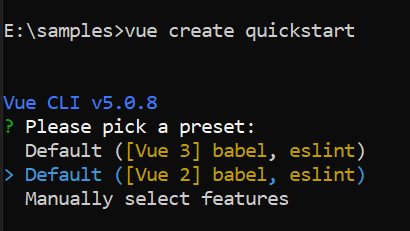How can I help you?
Getting Started with the Vue SpeechToText component in Vue 2
3 Feb 202610 minutes to read
This section explains how to create a simple SpeechToText and configure its available functionalities in the Vue environment.
Prerequisites
System requirements for Syncfusion® Vue UI components
Dependencies
The list of dependencies required to use the SpeechToText component in your application is given as follows:
|-- @syncfusion/ej2-vue-inputs
|-- @syncfusion/ej2-vue-base
|-- @syncfusion/ej2-base
|-- @syncfusion/ej2-buttons
|-- @syncfusion/ej2-popupsSetting up the Vue 2 project
To generate a Vue 2 project using Vue-CLI, use the vue create command. Follow these steps to install Vue CLI and create a new project:
npm install -g @vue/cli
vue create quickstart
cd quickstart
npm run serveor
yarn global add @vue/cli
vue create quickstart
cd quickstart
yarn run serveWhen creating a new project, choose the option Default ([Vue 2] babel, eslint) from the menu.

Once the quickstart project is set up with default settings, proceed to add Syncfusion® components to the project.
Add Syncfusion® Vue packages
Syncfusion® packages are available at npmjs.com. To use Vue components, install the required npm package.
This article uses the Vue SpeechToText component as an example. Install the @syncfusion/ej2-vue-inputs package by running the following command:
npm install @syncfusion/ej2-vue-inputs --saveor
yarn add @syncfusion/ej2-vue-inputsImport Syncfusion® CSS styles
You can import themes for the Syncfusion® Vue component in various ways, such as using CSS or SASS styles from npm packages, CDN, CRG and Theme Studio. Refer to themes topic to know more about built-in themes and different ways to refer to themes in a Vue project.
In this article, the Material theme is applied using CSS styles, which are available in installed packages. The necessary Material CSS styles for the SpeechToText component and its dependents were imported into the <style> section of src/App.vue file.
<style>
@import '../node_modules/@syncfusion/ej2-base/styles/material.css';
@import '../node_modules/@syncfusion/ej2-buttons/styles/material.css';
@import '../node_modules/@syncfusion/ej2-popups/styles/material.css';
@import '../node_modules/@syncfusion/ej2-inputs/styles/material.css';
</style>Add Syncfusion® Vue component
Follow the below steps to add the Vue SpeechToText component using Composition API or Options API:
1. First, import and register the SpeechToText component in the script section of the src/App.vue file. If you are using the Composition API, you should add the setup attribute to the script tag to indicate that Vue will be using the Composition API.
<script setup>
import { SpeechToTextComponent as EjsSpeechToText } from "@syncfusion/ej2-vue-inputs";
</script><script>
import { SpeechToTextComponent } from "@syncfusion/ej2-vue-inputs";
export default {
components: {
'ejs-speechtotext': SpeechToTextComponent
}
}
</script>2. In the template section define the SpeechToText component.
<template>
<div id='container'>
<ejs-speechtotext id="speechtotext"></ejs-speechtotext>
</div>
</template>Here is the summarized code for the above steps in the src/App.vue file:
<template>
<div id='container'>
<ejs-speechtotext id="speechtotext" @transcriptChanged="onTranscriptChange"></ejs-speechtotext>
<ejs-textarea v-model="textareaValue" rows="5" cols="50" resizeMode="None" placeholder="Transcribed text will be shown here..."></ejs-textarea>
</div>
</template>
<script setup>
import { ref } from "vue";
import { SpeechToTextComponent as EjsSpeechtotext, TextAreaComponent as EjsTextarea } from "@syncfusion/ej2-vue-inputs";
const textareaValue = ref('');
const onTranscriptChange = (args) => {
textareaValue.value = args.transcript;
};
</script>
<style>
@import '../node_modules/@syncfusion/ej2-base/styles/tailwind3.css';
@import '../node_modules/@syncfusion/ej2-buttons/styles/tailwind3.css';
@import '../node_modules/@syncfusion/ej2-popups/styles/tailwind3.css';
@import '../node_modules/@syncfusion/ej2-inputs/styles/tailwind3.css';
#container {
margin: 50px auto;
gap: 20px;
display: flex;
flex-direction: column;
align-items: center;
}
</style><template>
<div id='container'>
<ejs-speechtotext id="speechtotext" @transcriptChanged="onTranscriptChange"></ejs-speechtotext>
<ejs-textarea ref="textareaObj" rows="5" cols="50" value="" resize-mode="None" placeholder="Transcribed text will be shown here..."></ejs-textarea>
</div>
</template>
<script>
import { SpeechToTextComponent, TextAreaComponent } from "@syncfusion/ej2-vue-inputs";
import { enableRipple } from '@syncfusion/ej2-base';
enableRipple(true);
export default {
components: {
"ejs-speechtotext": SpeechToTextComponent,
"ejs-textarea": TextAreaComponent
},
methods: {
onTranscriptChange: function(args) {
this.$refs.textareaObj.ej2Instances.value = args.transcript;
}
}
}
</script>
<style>
@import '../node_modules/@syncfusion/ej2-base/styles/tailwind3.css';
@import '../node_modules/@syncfusion/ej2-buttons/styles/tailwind3.css';
@import '../node_modules/@syncfusion/ej2-popups/styles/tailwind3.css';
@import '../node_modules/@syncfusion/ej2-inputs/styles/tailwind3.css';
#container {
margin: 50px auto;
gap: 20px;
display: flex;
flex-direction: column;
align-items: center;
}
</style>Run the project
To run the project, use the following command:
npm run serveor
yarn run serveThe SpeechToText component requires an internet connection and browser support for the Speech Recognition API.
Customizing button content
The content of the SpeechToText button can be customized for its active and inactive states. Use the content property to define the text for the start listening state and the stopContent property for the stop listening state. These properties are configured within the buttonSettings property.
The following example shows how to configure buttonSettings in the SpeechToText component.
<template>
<div id='container'>
<ejs-speechtotext id="speechtotext" @transcript-changed="onTranscriptChange" :button-settings="buttonSettings"></ejs-speechtotext>
<ejs-textarea v-model="textareaValue" rows="5" cols="50" resizeMode="None" placeholder="Transcribed text will be shown here..."></ejs-textarea>
</div>
</template>
<script setup>
import { ref } from "vue";
import { SpeechToTextComponent as EjsSpeechtotext, TextAreaComponent as EjsTextarea } from "@syncfusion/ej2-vue-inputs";
const textareaValue = ref('');
const buttonSettings = {
content: 'Start Listening',
stopContent: 'Stop Listening'
};
const onTranscriptChange = (args) => {
textareaValue.value = args.transcript;
};
</script>
<style>
@import '../node_modules/@syncfusion/ej2-base/styles/tailwind3.css';
@import '../node_modules/@syncfusion/ej2-buttons/styles/tailwind3.css';
@import '../node_modules/@syncfusion/ej2-popups/styles/tailwind3.css';
@import '../node_modules/@syncfusion/ej2-inputs/styles/tailwind3.css';
#container {
margin: 50px auto;
gap: 20px;
display: flex;
flex-direction: column;
align-items: center;
}
</style><template>
<div id='container'>
<ejs-speechtotext id="speechtotext" @transcriptChanged="onTranscriptChange" :buttonSettings='buttonSettings'></ejs-speechtotext>
<ejs-textarea ref="textareaObj" rows="5" cols="50" value="" resize-mode="None" placeholder="Transcribed text will be shown here..."></ejs-textarea>
</div>
</template>
<script>
import { SpeechToTextComponent, TextAreaComponent } from "@syncfusion/ej2-vue-inputs";
import { enableRipple } from '@syncfusion/ej2-base';
enableRipple(true);
export default {
components: {
"ejs-speechtotext": SpeechToTextComponent,
"ejs-textarea": TextAreaComponent
},
data() {
return {
buttonSettings: {
content: 'Start Listening',
stopContent: 'Stop Listening'
}
};
},
methods: {
onTranscriptChange: function(args) {
this.$refs.textareaObj.ej2Instances.value = args.transcript;
}
}
}
</script>
<style>
@import '../node_modules/@syncfusion/ej2-base/styles/tailwind3.css';
@import '../node_modules/@syncfusion/ej2-buttons/styles/tailwind3.css';
@import '../node_modules/@syncfusion/ej2-popups/styles/tailwind3.css';
@import '../node_modules/@syncfusion/ej2-inputs/styles/tailwind3.css';
#container {
margin: 50px auto;
gap: 20px;
display: flex;
flex-direction: column;
align-items: center;
}
</style>